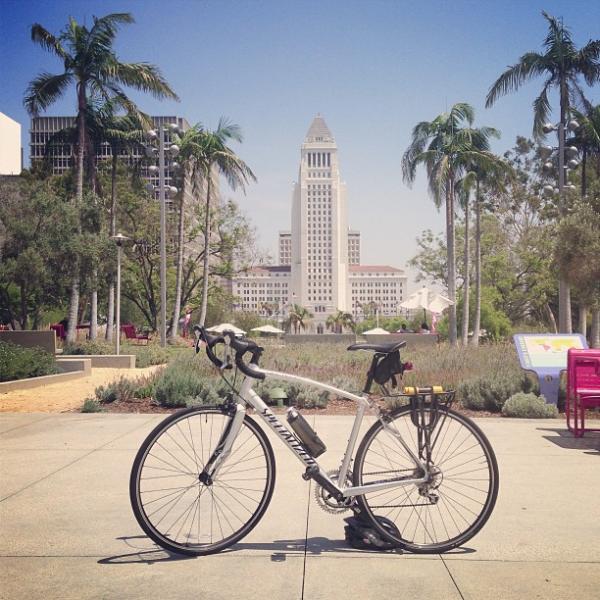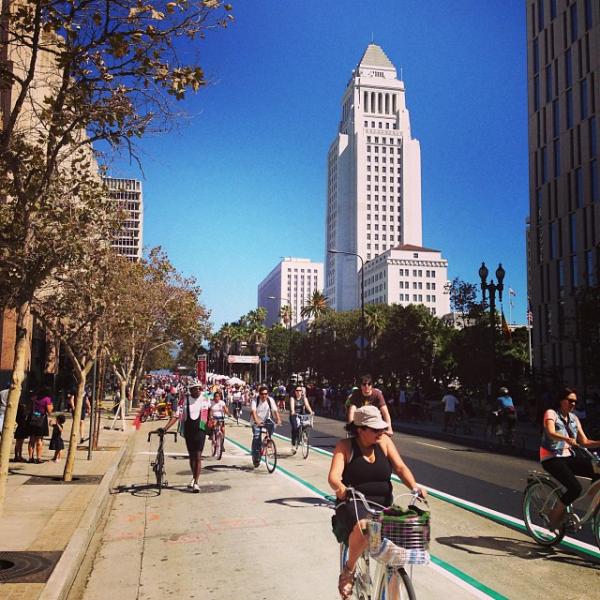Share A Bike? In L.A.? It Could Actually Happen

So why doesn’t Los Angeles, a city with flat streets and year-round 80 degree weather, have a Bike-Share system when so many other major cities do?
It turns out that actually Los Angeles very nearly had a system a few years ago. In early 2012, then-mayor Antonio Villaraigosa announced in tandem with Bike Nation, a Southern California based sharing company already established in Long Beach, Anaheim, and Fullerton, that Los Angeles would have 4,000 bikes ready for use around the city within the next year.
But as it turns out, it wasn't that simple.
Bike Nation’s business model was entirely private, and therefore depended on non-public sources of funding from both users of the system, and from the sales of ad space on bikes and kiosks.
This seemed alright, except that someone forgot that the city of Los Angeles signed a contract with advertising giant CBS Outdoor for exclusive advertising rights on “street furniture” until 2021. Bicycle kiosks apparently are considered “street furniture” by the terms of the contract, meaning that Bike Nation could not sell ad-space on their kiosks.
READ MORE: Cyclists Appeal To L.A. City Council To Make Streets Safer For Riders
After the company unsuccessfully attempted to find advertisers who would be willing to only advertise on the bicycles, they found that their business model that simply would not work in Los Angeles.
Since then, however, new proposals from the Los Angeles County Metropolitan Transit Authority have surfaced, offering Angelenos hope that one day soon they’ll be able to pedal around without worrying about locking or maintaining a bicycle of their own.
At the January meeting of Metro’s board of directors, agenda item 58 proposed that Metro undertake a study of how a bicycle sharing network in Los Angeles County would look.
This came after Metro adopted bicycles as a formal transportation method in October of 2013.
The motion, authored chiefly by Mayor Garcetti’s and County Supervisor Yaroslavsky’s offices, includes a basic framework of how a system would function throughout Los Angeles county, arguing that “a robust and regional bicycle share program needs to be adopted to address first-mile and last-mile transportation challenges.”
The terms first-mile and last-mile speak to the challenge of getting people to and from their exact origin/destination location. For example, if a person works about one mile away from the nearest rail station, they are less likely to use the rail system for transportation. In theory, if a bicycle share kiosk was located at the train station, then that person could use a combination of biking and bussing, instead of driving all the way to work.
In a spread out city like Los Angeles, planning for first/last mile solutions are critical.
READ MORE: CicLAvia Aims to Transform
Additionally, the January motion urges Metro to investigate one of two business models.
The first, like Bike Nation, would be for an entirely private venture. Like Bike Nation, it too would be subject to certain pitfalls like advertising challenges, and—as the motion’s authors phrase it— a “profit driven decision making process.”
Eric Bruins, Planning and Policy Director of the Los Angeles County Bicycle Coalition, believes that Metro should opt instead for the second option, where a public agency (Metro) would own and operate the sharing system, deriving revenue both from advertising and user fees.
Bruins said “a public model makes more sense. It’s easier to govern when there’s one agency in charge that can help ease collaboration across multiple cities.”
Bruins added that a single system governed by Metro has the added benefit of likely being compatible with the Metro’s TAP card system, enabling users to use one card for bus, train and bike transit.

“It would be harder because then the operator is more interested in profit," said Bruins. "They’d probably have to put the Kiosks where they would generate the most ad revenue instead of where they make the most sense—kind of like bus shelters.”
Bruins is referring to the tendency in such ventures to build bus stop shelters not where they would be most useful, but rather where ads can be sold. This is precisely why there are bus shelters in Westwood, but not Crenshaw. Bruins worries that the same thing would happen with bicycle kiosks.
READ MORE: Santa Monica Moves Forward With Transit-Oriented Neighborhood
The motion goes beyond just business models, however, advocating that Metro investigate adding stations in three pilot locations around the county: Pasadena, Downtown, and Santa Monica. Ostensibly, the sharing program would later be expanded to include the rest of L.A. County.
Incidentally, Santa Monica is charging ahead on its own bike-sharing program. According to Lucy Dyke, Santa Monica’s Deputy Director for Special Projects, Santa Monica is looking to hopefully have bikes on the ground within the year.
“We want it ready before the Expo Line is finished," said Dyke. "At this point we do have the funding and we do want to take advantage of that opportunity.”
The initial motion proposed in January stipulates that Metro report back with study findings at its board’s April meeting. A system enacted by Metro countywide would however, be compatible with Santa Monica’s own future system, according to Dyke.
Contact Staff Reporter Matthew Tinoco here.



